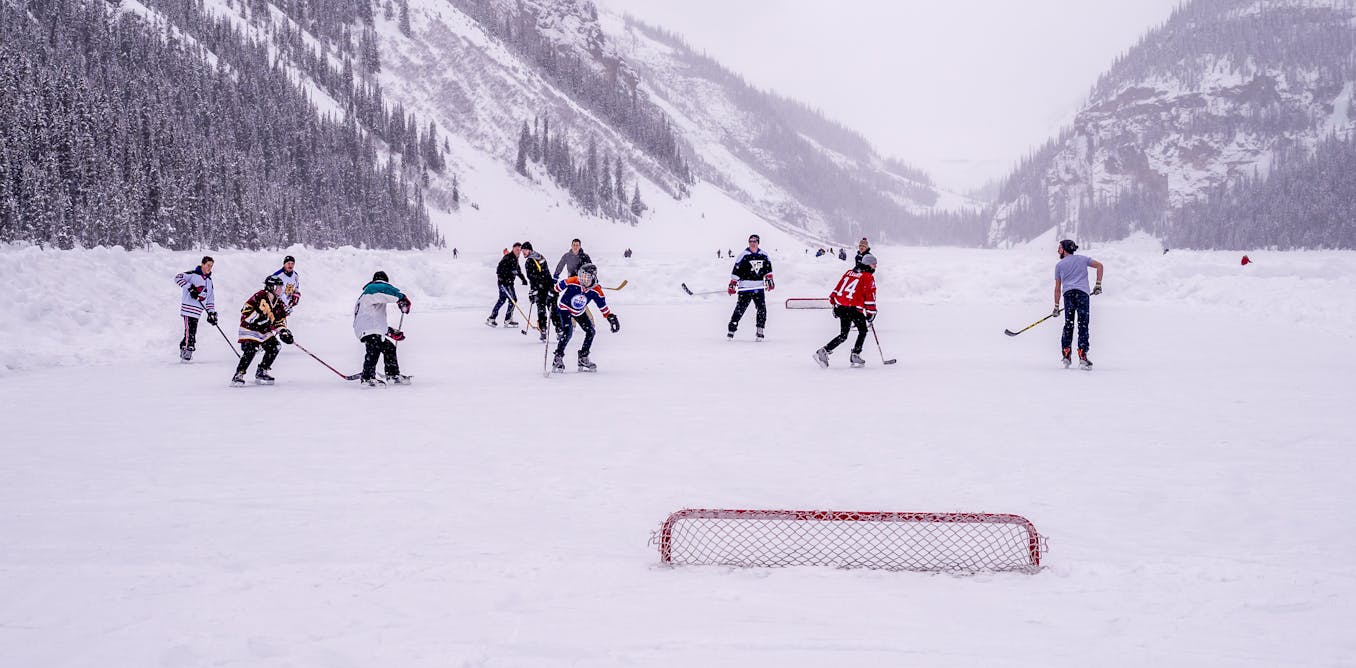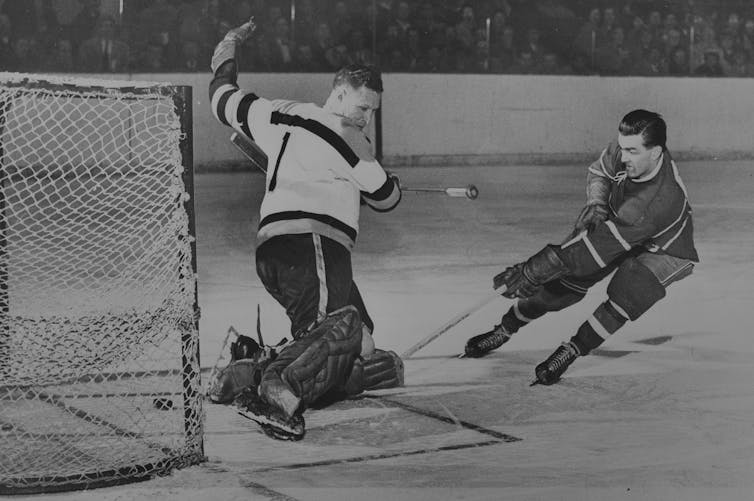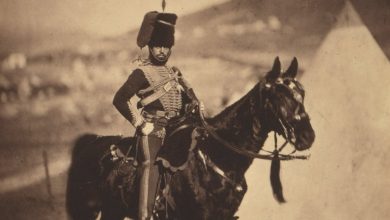Can it still bridge divides in an era of political polarization?

مجلة المذنب نت متابعات عالمية:
Hockey has played a significant role in shaping Canada’s culture and identity over the years. As sport scholar Tony Patoine once put it, “hockey has become more than a simple pasttime: it is a true Canadian tradition, a quasi-religion.”
This deep attachment to the game is reflected in Bill C-212, which acknowledges hockey as Canada’s official winter sport. Modern ice hockey was, after all, pioneered in Canada, where it has historically been watched, played and been perceived as a unifying force that transcends linguistic and ethnic divides.
Despite these perceptions, however, we question the strength of such unification potential amidst recent changes to hockey culture. Can hockey continue to unify all of Canada?
‘Communitas’
Hockey’s purported sense of unity closely relates to the concept of “communitas,” coined by anthropologist Victor Turner, which describes the strong bonds of comradery that form between members of a group — and sometimes between members of disparate groups — where rank and status disappear.
However, not everyone experiences this sense of unity equally. Since social groups establish behaviours required for group membership, those who don’t align with these norms may feel excluded.
THE CANADIAN PRESS/Darren Calabrese
Former Hockey Night in Canada commentator, Don Cherry, was once praised for upholding values characteristic of hockey, including the promotion of violence, hyper masculinity and an overall adherence to “ideas of loyalty, fraternity, and mutual respect.” These values, once normalized within the hockey community, shaped how both players and fans were expected to act.
But as the game continues to evolve and these values are increasingly considered archaic and out of sync with the broader political culture fostered within Canada, we as Canadian sport and political science researchers, respectively, question if hockey still provides that sense of communitas for all of Canada.
Hockey in French Canada
Although Canadians often view hockey as a monolithic, universally adopted sport across Canada, a closer look reveals patterns of non-uniformity. Nowhere are such differences more apparent than in the historical development of the sport in Québec versus the rest of Canada.
As historian Emmanuel Lapierre wrote, “French Canadians appropriated hockey in their own manner and used it to tell a story about themselves,” a story that is, like the province of Québec itself, unique within the Canadian federation.
For much of Canadian history, Anglophone hockey players represented the in-group, while Francophone hockey players were often seen as outsiders. In the 1950s, for example, Francophone players in the NHL believed they were treated more harshly when it came to suspensions and fines.
Québec society, during this time, faced an endemic struggle of oppression against an Anglophone-dominated society controlled by the Catholic Church. Francophone resistance to this was linked to the Richard Riot that occurred during the 1954-55 NHL season.

(Wikimedia Commons)
After Montreal Canadiens’ player Maurice “Rocket” Richard was suspended from the playoffs in March 1955 for punching an official, a massive riot broke out among fans. They raged through downtown Montréal, targeting Anglophone-owned buildings. This riot became a symbol of Francophone resistance to Anglophone dominance, serving as a stepping stone towards the Quiet Revolution and renewed French Canadian nationalism.
This, in turn, strengthened the sense of unity around hockey in Canada. Francophone hockey players began to be viewed as more equal to, and at the very least not controlled by, Anglophone players. Hockey was used to forge a sense of communitas amongst French Canadians, serving as a transcendent unifier in Canada.
But that was then, and it occurred within the context of a province historically rich with connections to French Canadian culture, where hockey’s unification potential was, therefore, heightened. Does this similar sense of communitas still exist in the rest of Canada with respect to hockey? Or has the sport’s ability to unite the nation become weakened in an era of unprecedented political polarization?
Hockey today
Hockey fandom remains strong in Canada, with about 31 per cent of Canadians still following the sport — the highest of any sport in the country. This is re-enforced by the recent success of the Professional Women’s Hockey League and the near-record Canadian viewership of the most recent Stanley Cup finals.
However, hockey participation has seen a notable decline, dropping 33 per cent since its peak in 2010 amidst high participation costs. Additionally, Hockey Canada has been accused of fostering a culture of misogyny and sexual assault.
Read more:
Hockey Canada scandal highlights toxic masculinity in sports
In 2023, Hockey Canada’s former CEO acknowledged the need to address racism, sexism, and other forms of discrimination in hockey culture. “Each topic, or part of culture that we’re trying to get at, that will determine who the audience is as we move forward,” he said.
As hockey navigates these changes, it must adapt to the growing emphasis on equity, diversity and inclusion, alongside the impacts of an increasing immigrant population and the globalization of the game.

THE CANADIAN PRESS/Jason Franson
This evolution could mean the demise of “traditional” hockey values, and perhaps that is a good thing: misogynistic, “rock ‘em and sock ’em” mentalities don’t align with the values of a modern liberal democracy like Canada.
Still, for communitas to transcend division, hockey must also find a way to bring traditional fans along, who may have enjoyed the undertones of violence and masculinized definitions of loyalty, fraternity and respect, without alienating them.
Where should hockey go now?
Hockey’s role as a unifying force in Canada is well established. Not only is it still Canada’s official winter sport, but as outlined above, it has also served as a unifier for French and English Canada. Hockey has, moreover, unified Canadians during other key moments, such as Canada’s victory over the USSR in the 1972 Summit Series, which symbolized democracy’s triumph over communism.
However, hockey’s role as a unifying force has diminished over the years. For many Canadians, hockey is no longer “the best game you can name,” as Stompin’ Tom Connors once sang.
If hockey is to maintain its historic place as a contributor to Canadian nationalism and communitas, the sport must evolve. While some traditional values — such as teamwork, loyalty and respect — should be preserved, outdated notions like hyper masculinity and aggression no longer align with today’s values.
As Canada changes, so too must hockey. Canadian hockey culture and policies must better adapt to meet contemporary Canadian values like diversity and inclusivity.
The question for Canadians isn’t just the future of hockey, but what can unite us in today’s world. Communitas need not be confined to hockey, let alone a sport. Hockey has traditionally filled this unification role, but if it fails to keep up, what will take its place?
نشكركم على قراءة المنشور عبر مجلة المذنب نت, المتخصصة في التداول والعملات الرقمية والمشفرة















